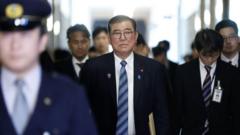In an important diplomatic encounter, Japanese Prime Minister Shigeru Ishiba is scheduled to meet President Donald Trump at the White House on Friday, marking the former's inaugural in-person discussions with the American leader. The meeting symbolizes a significant opportunity for Ishiba to strengthen connections with the U.S., Japan's major foreign ally.
Central to the agenda will be economic and security issues, notably the threats posed by North Korea. Alongside this, discussions are anticipated to cover advanced technologies such as artificial intelligence. Ishiba's approach is characterized by a focus on fostering a trusting personal bond with Trump, reminiscent of the close relationship Trump shared with former Prime Minister Shinzo Abe during his first term.
This visit is particularly notable as it represents the first encounter by an Asian leader with Trump following the commencement of his second administration earlier this year. Prior to Ishiba's visit, Israeli Prime Minister Benjamin Netanyahu made a brief trip to Washington, setting the stage for high-level international dialogue.
Ishiba emphasized the significance of building a personal rapport during his remarks to the press before departing for the U.S. He aims to carefully prepare for the discussions, having sought input from the widow of Shinzo Abe, who attended Trump's inauguration, and from previous Japanese leaders like Fumio Kishida.
U.S. officials view the upcoming talks as pivotal for fostering "peace and prosperity" in the Pacific region. Discussions are expected to include cooperative military training initiatives between the U.S. forces and Japan's Self-Defence Forces, as well as defense investment strategies. The topics of semiconductor technology and artificial intelligence will also feature prominently in the talks.
From Japan's perspective, Ishiba intends to reaffirm Japan's position as a vital economic partner for the U.S., showcasing that it has consecutively been the largest foreign investor in the U.S. for the past five years. Japanese corporations are recognized for being significant job creators, employing tens of thousands across states such as Kentucky.
In terms of defense, dialogue is likely to touch on Japan's recent commitment to elevate its defense spending to 2%, a figure still below the 5% goal Trump has suggested for NATO members. Attention will also be given to mutual apprehensions about North Korea's military advancements and its growing relations with Russia, including potential missile technology transfer threats. American officials have echoed Japan's desire for a de-nuclearized North Korea as part of their overarching strategy in the region.
Central to the agenda will be economic and security issues, notably the threats posed by North Korea. Alongside this, discussions are anticipated to cover advanced technologies such as artificial intelligence. Ishiba's approach is characterized by a focus on fostering a trusting personal bond with Trump, reminiscent of the close relationship Trump shared with former Prime Minister Shinzo Abe during his first term.
This visit is particularly notable as it represents the first encounter by an Asian leader with Trump following the commencement of his second administration earlier this year. Prior to Ishiba's visit, Israeli Prime Minister Benjamin Netanyahu made a brief trip to Washington, setting the stage for high-level international dialogue.
Ishiba emphasized the significance of building a personal rapport during his remarks to the press before departing for the U.S. He aims to carefully prepare for the discussions, having sought input from the widow of Shinzo Abe, who attended Trump's inauguration, and from previous Japanese leaders like Fumio Kishida.
U.S. officials view the upcoming talks as pivotal for fostering "peace and prosperity" in the Pacific region. Discussions are expected to include cooperative military training initiatives between the U.S. forces and Japan's Self-Defence Forces, as well as defense investment strategies. The topics of semiconductor technology and artificial intelligence will also feature prominently in the talks.
From Japan's perspective, Ishiba intends to reaffirm Japan's position as a vital economic partner for the U.S., showcasing that it has consecutively been the largest foreign investor in the U.S. for the past five years. Japanese corporations are recognized for being significant job creators, employing tens of thousands across states such as Kentucky.
In terms of defense, dialogue is likely to touch on Japan's recent commitment to elevate its defense spending to 2%, a figure still below the 5% goal Trump has suggested for NATO members. Attention will also be given to mutual apprehensions about North Korea's military advancements and its growing relations with Russia, including potential missile technology transfer threats. American officials have echoed Japan's desire for a de-nuclearized North Korea as part of their overarching strategy in the region.






















